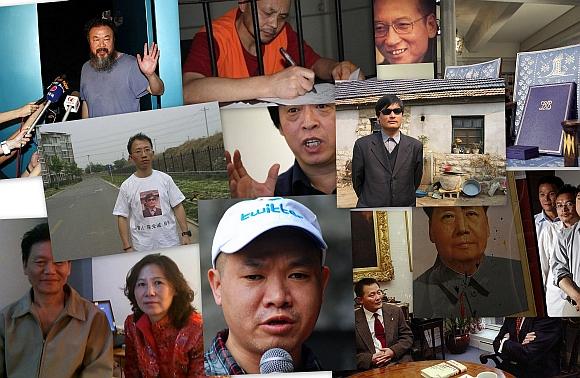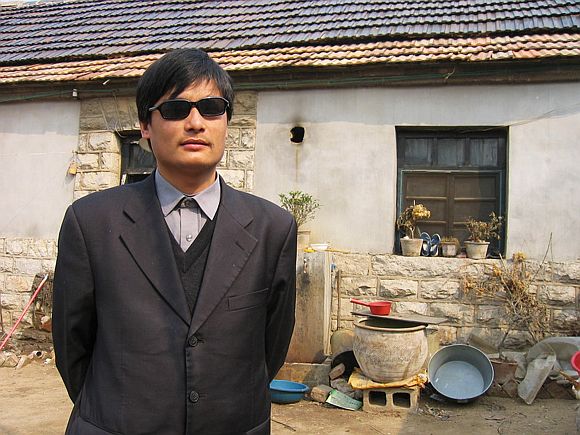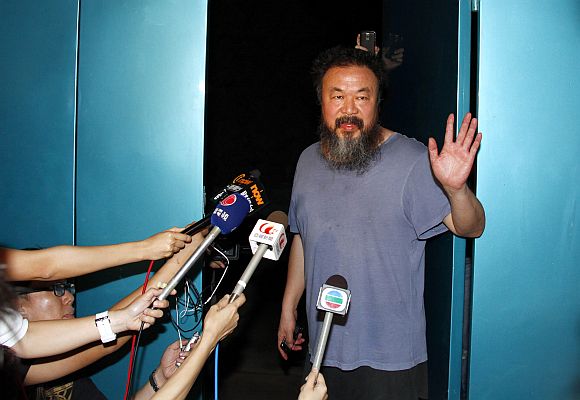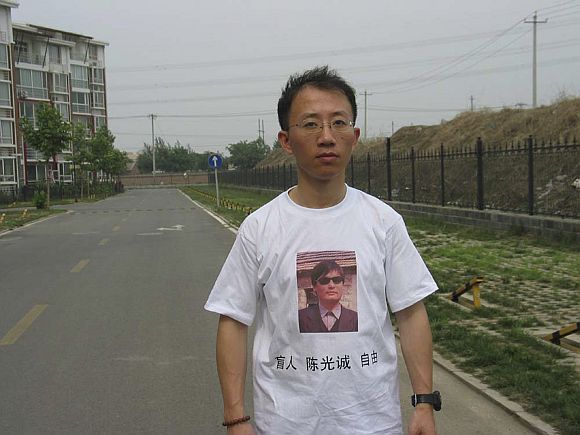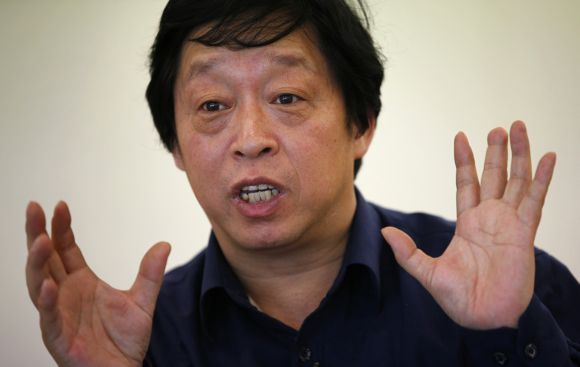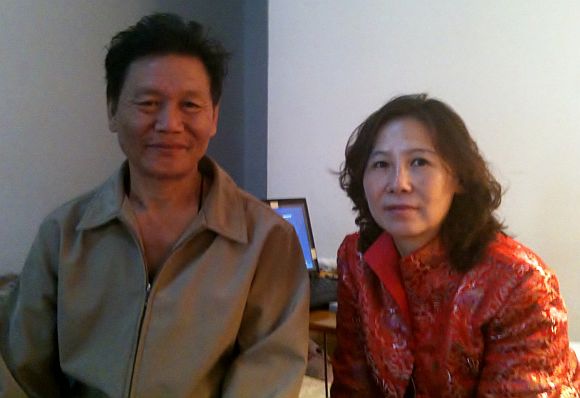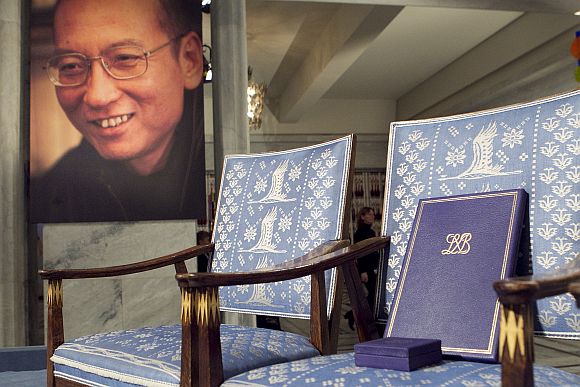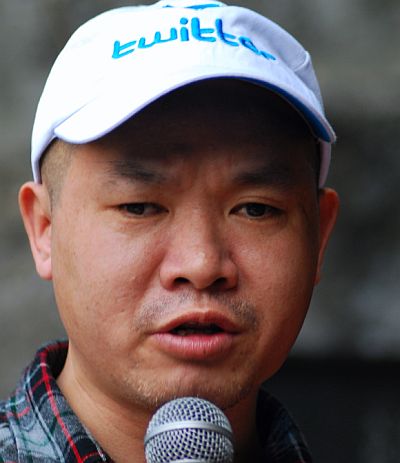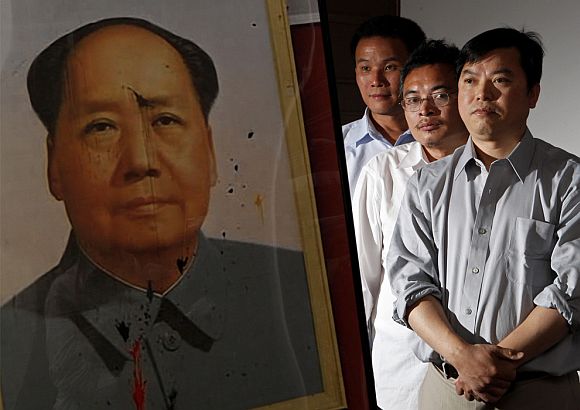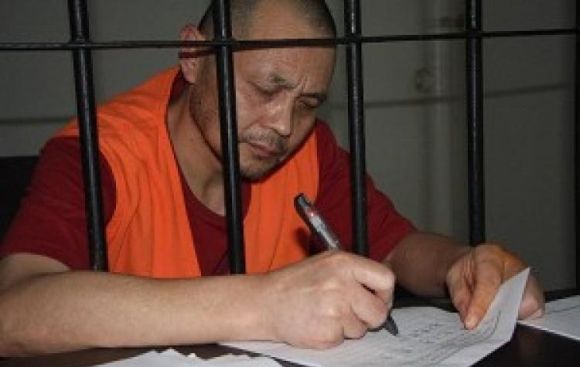 | « Back to article | Print this article |
Diehard dissidents: People who took on China's iron fist
A person who strongly disagrees with and criticises their government, especially in a country where this kind of action is dangerous... this is how communist China defines the term dissident in its dictionary.
Those who dare to slam hard on the foundations of the great wall of communism are treated with no mercy in the land of Chairman Mao.
From standing up for democratic rights to human rights to freedom of expression, these so-called 'dissidents' have time and again jolted the communist leadership with their activities.
We take a look at some such brave individuals.
Click on NEXT to go further...
Chen Guangcheng, the barefoot lawyer
Chen Guangcheng
The latest victim of Chinese crackdown on dissidents, activist Guangcheng hit the headlines when he sought asylum at the US embassy for a week after escaping from house arrest in his home village in Shandong province
Blind from an early age and self-taught in the law, Chen is described as a "barefoot lawyer" who advocates for women's rights and the poor. He is best known for exposing alleged abuses in official family planning policy, often involving claims of violence and forced abortions.
The communist government struck back. Guancheng was punished with a four-year prison sentence in 2006 on charges that were almost certainly trumped up, including the odd accusation that he 'disrupted traffic'.
When Guancheng was released from prison in 2010, he was immediately placed under house arrest, where he remained until last week. His family was also singled out for harassment, with his daughter being prevented from attending school in 2011.
Click on NEXT to go further...
Ai Weiwei, the artist under scanner
Ai Weiwei
The famed artiste, celebrated worldwide for his audacious conceptual sculptures and photographs, has been one of the biggest critics of communist China.
The government sent him to jail for 81 days in April 2011 for posting politically-charged statements on his blog, which was shut down as soon as authorities stumbled upon it. The official take was that Weiwei was arrested for alleged tax-evasion.
Following a global hue and cry over his detention, he was released from prison on June 22, 2011 citing his 'good attitude in confessing'.
Weiwei, who designed the astounding Bird's Nest stadium for Beijing Olympics, is today under scanner of authorities and fighting tax evasion charges.
Click on NEXT to go further...
Hu Jia, the human rights crusader
Hu Jia
The European parliament presented him (in absentee) a human rights award but Beijing termed him a criminal -- Jia hit headlines in 2008 when Beijing played host to the Olympics with his campaign for civil liberties.
According to Jia, China's problems were rooted in authorities' lack of respect for human rights. In his campaigns, which were taken around the world through social networking channels, he advocated that the administration was trying to mask the ills that dog the country's poor using the 2008 Olympics as a mirage.
The administration, which sensed the danger that Jia posed, cracked the whip and packed him off to jail.
He was released from prison three years later. Hu -- who suffers from a liver ailment -- was deprived of his political rights for a year and was prohibited from speaking to the media.
Click on NEXT to go further...
Liu Anjun, the Jasmine victim
Liu Anjun
Liu Anjun, the director of the Sunshine Charity group, which advocates on behalf of homeless petitioners in Beijing, was detained in various locations for allegedly speculating in an interview to Radio Free Asia about that the 'Jasmine Revolution' in Egypt could find its way to China.
According to China Human Rights Defenders, a network of domestic and overseas Chinese human rights activists and groups, he was first detained in Fengtai district by Beijing security officials from April 8 to April 13, 2010. Then Liu reportedly was abducted by unknown persons from March 26 to April 4, 2010.
On February 18, Liu, disabled from a beating reportedly by unknown individuals, was detained by the police and locked up in a hotel room in south Beijing. For six days, interrogators showed him pictures of dissidents, human rights lawyers and activists, seeking information about their mutual contacts, beliefs and plans.
According to the Guardian newspaper, authorities were hunting for evidence of a web of conspiracy bringing together domestic and foreign foes that the Chinese government believed were behind Middle East-inspired calls for "jasmine revolution" protests against the party.
Anjun was released after 45 days of intense interrogation and remains under watch.
Click on NEXT to go further...
Ni Yulan and Dong Jiqin, savoiurs of the homeless
Ni Yulan and Dong Jiqin
Lawyer Ni Yulan's kneecaps and feet were broken allegedly by the police during her detention in 2002 when she started her protest against government-backed land acquisitions in the country. She herself was a victim -- her home in central Beijing was requisitioned and later demolished.
Unfazed by State terror, the disabled lawyer and her husband Dong Jiqin continued their battle, providing legal help to people whose homes had been seized by the government.
Then in April 2011, the couple was detained as authorities rounded up scores of activists amid online calls for protests similar to those taking place at the time in the Arab world.
In a hush-hush trial held behind closed doors, the couple was sent to jail for two years evoking global condemnation of Beijing's attempts to stifle human rights.
Click on NEXT to go further...
Liu Xiaobo, the Nobel laureate behind bars
Liu Xiaobo
This Nobel Peace Prize winning artist is serving an 11-year jail term since 2008 for expressing his resistance to oppression and censorship enforced by the communist government.
Xiaobo was sentenced to 11 years in prison on a charge of "inciting subversion of state authority" for participating in many initiatives aimed at obtaining political reform in China, including Charter 08, which calls for true democracy and respect for human rights in China.
As with many other dissidents, Xiaobo's only real crime was to dare to raise his voice and participate with other Chinese intellectuals in a debate about his country's future.
Held in Jinzhou prison in the northeastern province of Liaoning, Liu is deprived of any contact with the outside world. His wife, Liu Xia, is under a form of house arrest in Beijing, where she is subject to permanent police surveillance, cut off from the outside world and prevented from publishing her works.
A politically-committed intellectual and poet, Xiaobo has become a symbol of the Chinese government's repression of intellectuals, artists, human rights lawyers and activists, dissidents, journalists, bloggers and ordinary members of the public, whose basic freedoms of opinion, expression and information are constantly flouted by the authorities.
Click on NEXT to go further...
Ran Yunfei, the anti-censorship crusader
Ran Yunfei
Ran Yunfei, blogger and free speech advocate, is today under 'residential surveillance' (Chinese for house arrest).
His battle against state-sponsored censorship has earned him the wrath of authorities on numerous occasions.
After anonymous calls were made on overseas exile Chinese websites for a Jasmine Revolution in China, Ran wrote that China needed reform or would end up like the North African states that were then in turmoil.
(He also has an account on Twitter (@ranyunfei) with 57,000 followers -- viewable in China only with a VPN or proxy -- and another blog on a permitted Chinese microblog, Sina Weibo with 70,000 followers)
Yunfei was one of many bloggers and online activists who were detained by police amidst the online calls for a revolution. He was let off, without being charged, after six months in detention when the authorities felt that the calls for revolution had cooled off.
Click on NEXT to go further...
Lu Decheng, the man who threw an egg on Mao
Lu Decheng
Lu Decheng and his friends, Yu Zijian and Yu Dongyue did what a billion-odd Chinese would dare not to.
During the Tiananmen Square protests of 1989, the trio lobbed paint-filled eggs at the massive portrait of Mao Zedong at the Square to make their voice against state-sponsored human rights abuses heard.
Decheng was sentenced to 16 years in prison, Yu Dongyue to 20 years, and Yu Zijian was handed a life sentence.
As political prisoners, not only were they given the same physical work as other criminals but were also subjected to psychological torture.
Dongyue now suffers from mental illness from the torture he endured.
After his release from jail in 1998, Decheng told media persons that defacing the former leader's portrait in Tiananmen Square was a simple, quick way to tell people not to have illusions about Mao and the party. It was a call for the regime to end.
Click on NEXT to go further...
Tan Zuoren, the corruption digger
Tan Zuoren
The world mourned when the devastating 2008 earthquake in Sichuan province flattened numerous schools killed thousands of children. But what was the buried in the rubble and grief was the widespread corruption that ensured that buildings around the schools withstood the jolt.
Activist Tan Zuoring dug up the scandal behind the poor construction of schools.
All he did was to publish his personal diary and an investigative report into the deaths of students for the authorities to pounce on him and send him to jail.
The Chinese authorities, wanting to keep the corruption under wraps, charged him for comments made on online articles about the violent crackdown on Tiananmen Square protests in 1989.
The Guardian newspaper quoted fellow activist and artist Ai Weiwei, who also attempted to tally the number of pupils who died in the disaster, as saying: "Tan's case is the most important one to take place recently, because it is a sign of a huge step backwards in China's judicial ethics and independence after decades of reform and opening. Tan Zuoren received such a serious punishment only for believing or writing in his [online] diaries that there were problems with the earthquake. It is ridiculous. Though China claims to the world that it is a major country, the case just shows how fragile and lacking in confidence it is."
Click on NEXT to go further...
Wei Jingsheng spent 18 years in jail
Wei Jingsheng
Wei Jingsheng is the best-known Chinese human rights and democracy fighter and is the leader for the opposition against the Chinese communist dictatorship.
He was sentenced to jail twice for a total of more than 18 years due to his democracy activities, including a ground breaking and well publicised essay he wrote in 1978: The Fifth Modernisation. In the essay, Jingsheng stated that without democracy, China could not truly modernise.
His essay caused a sensation -- not only because it openly assaulted the 'people's democratic dictatorship' propaganda of the communists, but also because the author dared to sign the essay with both his real name and address.
In 1979, Wei was charged with having passed "secret" information concerning the 1979 Sino-Vietnamese war to a foreigner, and engaging in ""counter-revolution propaganda and agitation." He was sentenced to 15 years.
Within six months of his release in 1993 he was arrested a second time. He was tried again, convicted of "counter-revolution" and sentenced to another 14 years. In 1997, Wei was taken from his cell and placed on a plane bound for the United States as a bargain result between then US President Bill Clinton and the Chinese President Jiang ZeMin.
Jingsheng, who now resides in Washington, DC, has been using his influence to push for human rights and democracy in China.
Click on NEXT to go further...
Top photo features of the week
Click on MORE to see another set of PHOTO features...
